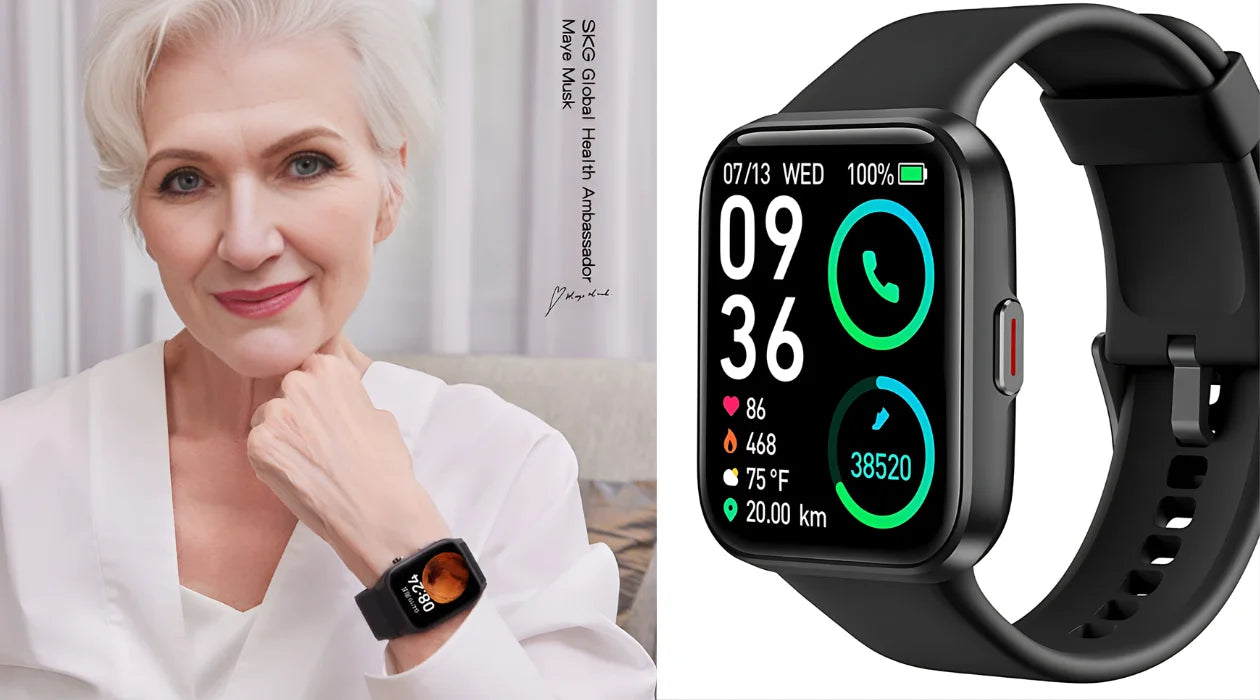In recent years, smartwatches have become hugely popular for their convenience and functionality. It's like a small cell phone on your wrist that can talk, text, and watch your health.
But smartwatches are much more than that. For many health-conscious users smartwatches are an amazing and convenient thing to have.
What Is A Smart Watch

A smart watch is an intelligent device worn on the wrist. It combines the timing function of a traditional watch with the functions of a smartphone. It is stylish, lightweight, and easy to wear. It has functions such as health monitoring, communication interaction, exercise tracking, and payment. It is also equipped with various sensors to monitor heart rate.Even use voice commands to interact with virtual assistants like Siri or Google Assistant.
What Can a Smartwatch Do?
1. Health Management
One of the biggest advantages of smartwatches is the ability to monitor and manage health conditions. These devices are equipped with a variety of sensors that can track important health metrics, including heart rate, steps, calories burned, and sleep patterns.
Smartwatches can be particularly helpful for people with chronic illnesses. For example, diabetics can use them to track blood sugar levels and set medication reminders. Athletes and fitness enthusiasts can optimize their training plans with detailed workout analysis and recovery recommendations.
2. Smart Notifications
By syncing with your smartphone, the smartwatch can display alerts for incoming calls, messages, emails, and app notifications right on your wrist. When you're not used to using your phone (such as while exercising or driving), the smartwatch has a built-in microphone and speaker that can be paired with wireless headphones and can automatically make and receive calls using voice commands.
3. Sports Assistant
For sports and fitness enthusiasts, it is very inconvenient to carry and use mobile phones while exercising, but smart watches do not have this problem. They can also record distance and pace, provide you with professional advice in the form of data, and monitor the amount of activity and calorie consumption during the period, so that you know how much food you should eat, helping you achieve your fitness goals faster and more effectively.
4. Payment Function
Many smartwatches support contactless payments through services like Apple Pay, Google Pay or Samsung Pay, allowing users to make purchases without carrying a wallet. Whether you're grabbing a cup of coffee after a run or buying groceries, paying with your smartwatch is fast and easy
5. Diverse Applications
There are also functions such as weather forecasts, music playback, calendar reminders, etc. Users can freely choose to install and use various applications according to their own needs so that the smart watch can better meet personalized needs.
6. Fashion
Smart watches have various designs and exquisite appearances, which can meet the aesthetic needs of different users. Some smartwatches also support custom watch faces. Users can choose their favorite watch face wallpaper according to their preferences and occasions.
7. Battery Life
Battery life is an important consideration when choosing a smartwatch. Advances in technology allow smartwatches to offer days of battery life on a single charge. Some smartwatches offer power-saving modes that extend battery life by limiting certain functions.
8. Waterproof
Water resistance is another important feature of smartwatches. Most modern smartwatches have varying degrees of water resistance and can withstand splashes, rain, and even submersion in water. This makes them suitable for activities such as swimming, showering, and exercising in wet conditions.
For example, the SKG V7 Pro smartwatch endorsed by Meyer Musk has an IP68 waterproof rating and is suitable for use when swimming in the pool, running in the rain, or sweating in the gym. It also has a large-capacity battery that can last for about 8-12 days for daily use, no need to worry about frequent charging.

9. Safety
Some smartwatches have location and fall detection features.
The GPS function of the smartwatch allows for precise location tracking. This is useful for navigation, outdoor sports, and safety. For example, if you're hiking or running in an unfamiliar area, a smartwatch can help you find your way back or share your location with friends and family.
Fall detection is useful for elderly people or pregnant women. With built-in sensors, the smartwatch can detect if you have fallen. If no movement is detected after a fall, the smartwatch will automatically send an alert to an emergency contact or call emergency services.
FAQ
What Is The Correct Way To Wear A Smart Watch?
The best position is 1-2 finger widths above the wrist bone, where the sensor most accurately senses heart rate, activity level, and other health indicators. Here are some additional tips for wearing your smartwatch correctly:
- Close fit: Try to fit the watch as close to the skin as possible to prevent the watch from moving up and down and causing inaccurate sensor readings. It should not be too tight, otherwise it will cause discomfort and restrict blood flow.
- Adjust at any time: Your wrist will bend during exercise and you need to move the watch upward to avoid squeezing your wrist.
- Keep it clean: Smartwatch bands and sensors need to be cleaned regularly to avoid affecting the sensors irritating the skin and causing allergies.
How Does A Smart Watch Detect Blood Pressure?
Smartwatches measure blood pressure using an optical heart rate sensor on the back of the device.
These sensors use photoplethysmography to measure the time it takes for the pulse wave to travel from the heart to the wrist, a method called pulse transit time (PTT).
Blood pressure affects PTT; higher blood pressure results in a faster pulse transit time, while lower blood pressure results in a slower time. It estimates blood pressure by calculating the time it takes blood to travel from the heart to the wrist.
How Do Smartwatches Count Calories?
Smartwatches use a combination of sensors and algorithms to count calories.
Your personal data, such as height, weight, age, and gender, is used to calculate your basal metabolic rate (BMR), which is the number of calories you burn while at rest.
The smartwatch then uses an accelerometer to track your movements and a heart rate monitor to measure the intensity of your activity.
By combining this data, the smartwatch can assess your energy expenditure and provide an estimate of the calories you burn from exercise.
What are the Disadvantages of Wearing a Smartwatch?
Excessive use of smartwatches can have several side effects. Some of the most commonly known concerns include:
Radiation Exposure: Smartwatches emit Bluetooth and Wi-Fi signals, which some people worry could be harmful to health. While there is currently no scientific evidence to support the claim that these signals pose a significant health risk, it remains a concern for some users.
Eye Strain: Staring at the small screen of a smartwatch for prolonged periods can lead to eye strain. This is especially true if you frequently check notifications, read messages, or use apps on the device.
Distraction: The constant flow of notifications and alerts from a smartwatch can be distracting, potentially reducing your productivity and focus. This can be particularly problematic in work or study environments.
Battery Life Concerns: Frequent use of smartwatches can lead to the need for regular charging, which may be inconvenient. Additionally, the battery life of smartwatches is generally shorter than that of traditional watches.
Potential for Dependency: Relying heavily on a smartwatch for daily tasks, reminders, and notifications can lead to a dependency on the device, making it challenging to function without it.
Conclusion
In short, smartwatches have many advantages and bring convenience to our daily lives. From health management and smart notifications to sports assistance and safety features, the capabilities of smartwatches will only continue to expand as technology continues to advance, making them an integral part of our connected lives.
Whether you're a fitness enthusiast, a busy professional, or someone looking for a stylish accessory, SKG smartwatch suits you.




